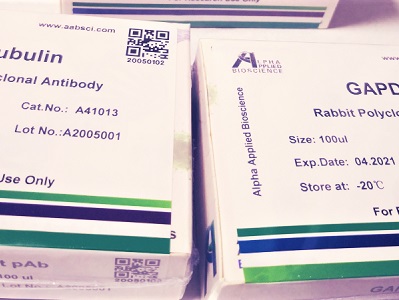

P63-α mouse mAb(3F11)
Cat :A19362
-
Source
Mouse
-
Applications
WB,IHC
-
Reactivity
Human, Mouse, Rat
-
Dilution
IHC 1:50-200, WB 1:500-2000
-
Storage
-20°C/1 year
-
Specificity
This antibody detects endogenous levels of human P63-α
-
Source/Purification
The antibody was affinity-purified from mouse ascites by affinity-chromatography using specific immunogen.
-
Immunogen
Synthesized peptide derived from human P63-α
-
Uniprot No
Q9H3D4
-
Alternative names
Tumor protein 63 (p63) (Chronic ulcerative stomatitis protein) (CUSP) (Keratinocyte transcription factor KET) (Transformation-related protein 63) (TP63) (Tumor protein p73-like) (p73L) (p40) (p51)
-
Form
Liquid in PBS containing 50% glycerol, 0.5% BSA and 0.02% sodium azide.
-
Clonality
Monoclonal
-
Isotype
IgG
-
Background
tumor protein p63(TP63) Homo sapiens This gene encodes a member of the p53 family of transcription factors. The functional domains of p53 family proteins include an N-terminal transactivation domain, a central DNA-binding domain and an oligomerization domain. Alternative splicing of this gene and the use of alternative promoters results in multiple transcript variants encoding different isoforms that vary in their functional properties. These isoforms function during skin development and maintenance, adult stem/progenitor cell regulation, heart development and premature aging. Some isoforms have been found to protect the germline by eliminating oocytes or testicular germ cells that have suffered DNA damage. Mutations in this gene are associated with ectodermal dysplasia, and cleft lip/palate syndrome 3 (EEC3); split-hand/foot malformation 4 (SHFM4); ankyloblepharon-ectodermal defects-cleft lip/palate; ADULT syndrome (acro-dermato-ungual-lacrim
-
Other
TP63 KET P63 P73H P73L TP73L, P63-α
-
Concentration
1 mg/ml
| Product | Reactivity | Applications | Conjugation | Catalog | Images |
|---|
-
 400-836-3211
400-836-3211
-
 support@aabsci.com
support@aabsci.com
-
β-actin rabbit pAb ...... >
-
β-actin rabbit pAb(A284) ...... >
-
Plant-actin rabbit pAb ...... >
-
β-tubulin mouse mAb(M7) ...... >
-
GAPDH mouse mAb(2B8) ...... >
-
GAPDH mouse mAb(PT0325) ...... >
-
Histone H3 rabbit pAb ...... >
-
Histone H3 rabbit pAb ...... >
-
COX IV mouse mAb(6C8) ...... >
-
GFP-Tag mouse mAb(1G6) ...... >
-
HA-Tag mouse mAb(1B10) ...... >
-
mCherry-Tag mouse mAb(6B3) ...... >










 400-836-3211
400-836-3211
